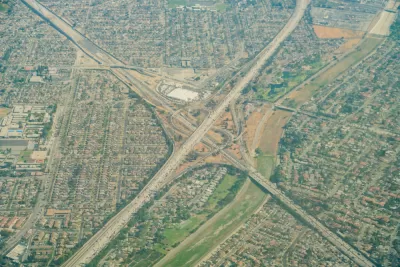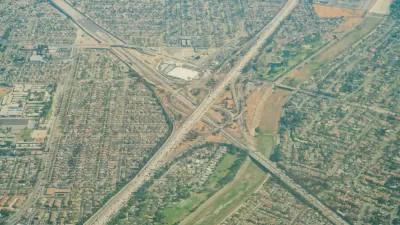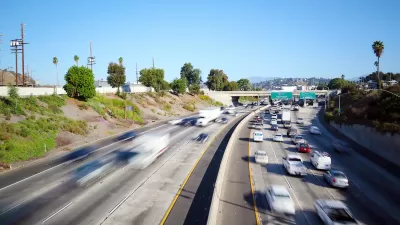Political opposition to the controversial I-605 Corridor Improvement Project is gaining traction on the Los Angeles County Metropolitan Transportation Authority Board of Directors.

The Los Angeles County Metropolitan Transportation Authority (Metro) Board of Directors hit the brakes on a controversial freeway widening project proposed for Interstate 605 and intersecting sections of interstates 5, 10, and 105 in addition to California State Route 60.

The Metro board unanimously approved a motion to delay the I-605 Freeway Corridor Improvement Project "and to study alternatives that would minimize the demolition of homes," reports Joe Linton.
According to Linton, "Metro’s official statements, including a September 29 letter from CEO Phil Washington, have been largely dismissive" of negative feedback on the project. The Gateway Cities Council of Governments (GCCOG) and the city of Downey are two local jurisdictions cited by Linton as examples of community opposition to I-605 Corridor Improvement Project. The Metro Board of Directors, however, responded to that feedback. Linton provides more detail about the board's actions:
Last week, six boardmembers put forth a motion that delays the release of the project environmental studies (draft Environmental Impact Statement/Environmental Impact Report – dEIR/EIS) until after Metro staff study more alternatives. The motion specified that those alternatives will include one that “minimizes right-of-way impacts” and/or a “Transportation System/Demand Management (TSM/TDM) alternative” similar to what the board approved in place of the canceled $6 billion North 710 Freeway tunnel project through South Pasadena.
Linton also provides details of the widespread opposition to the project expressed by members of the board.
FULL STORY: Metro Board Unanimously Approves Motion to Delay 605/5 Freeway Widening and Instead Study Alternatives

Study: Maui’s Plan to Convert Vacation Rentals to Long-Term Housing Could Cause Nearly $1 Billion Economic Loss
The plan would reduce visitor accommodation by 25,% resulting in 1,900 jobs lost.

North Texas Transit Leaders Tout Benefits of TOD for Growing Region
At a summit focused on transit-oriented development, policymakers discussed how North Texas’ expanded light rail system can serve as a tool for economic growth.

Using Old Oil and Gas Wells for Green Energy Storage
Penn State researchers have found that repurposing abandoned oil and gas wells for geothermal-assisted compressed-air energy storage can boost efficiency, reduce environmental risks, and support clean energy and job transitions.

Texas State Bills Could Kill Transit Funding in Dallas, Austin
State lawmakers could pull funding from the state’s largest transit agency and the ambitious Project Connect, a voter-approved transit project in Austin.

Opinion: DC Encampment Sweeps Hide, but Don’t Solve, Homelessness
President Trump recently ordered the clearing of encampments built by unhoused people on federal land in Washington, D.C.

Santa Barbara Could Build Housing on County Land
County supervisors moved forward a proposal to build workforce housing on two county-owned parcels.
Urban Design for Planners 1: Software Tools
This six-course series explores essential urban design concepts using open source software and equips planners with the tools they need to participate fully in the urban design process.
Planning for Universal Design
Learn the tools for implementing Universal Design in planning regulations.
Ascent Environmental
Borough of Carlisle
Institute for Housing and Urban Development Studies (IHS)
City of Grandview
Harvard GSD Executive Education
Toledo-Lucas County Plan Commissions
Salt Lake City
NYU Wagner Graduate School of Public Service





























